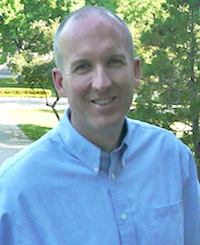 Michael Rea
Michael Rea
Michael Rea, a professor in Notre Dame’s Department of Philosophy, has been named the 2017 speaker for the prestigious Gifford Lectures at the University of St. Andrews in Scotland.
The 128-year-old lecture series—described by historian Jacques Barzun as “the highest honor in a philosopher’s career”—invites pre-eminent thinkers to address topics related to religion, science, and philosophy.
“I am deeply honored, and very grateful for the invitation,” Rea said. “It gives me an opportunity to develop my thoughts on a topic that is not only philosophically and religiously significant, but important to me personally as well.”
Rea will deliver a series of six lectures, titled “Though the Darkness Hide Thee: Seeking the Face of the Invisible God,” from March 27 to April 7, 2017. He plans to take a theologically informed approach to the topic of “divine hiddenness,” the idea that God’s existence is far less evident—and vivid, unambiguous experience of God’s presence is much less frequent—than one might expect from a perfectly loving deity.
Philosophers often treat divine hiddenness as evidence that God doesn’t exist, and the idea is even a continual challenge for believers, including devout Christians like Mother Teresa, Rea said.
But that line of thinking is based on drawing parallels between divine love and human love, he said. In his lectures, he will contend that it is not reasonable to believe that perfect, divine love would resemble human perceptions of ideal parental or romantic love.
“The church has, for most of its history, held that God is transcendent, and many divine attributes are very different from their human counterparts,” he said. “We have good reason to think that perfect love would be very different. Thinking about that gives you the resources to at least block the inference to the non-existence of God.”
Additionally, Rea will chart how divine behavior can plausibly be viewed as inherently loving. He contends that divine presence is more widely accessible than many people think it is, and that the way God communicates with his followers in the Bible is not that far removed from the way modern Christians describe religious experiences or divine inspiration.
Rea’s lectures, which will be made available online and are being adapted from a book to be published at a later date, connect to his work as co-principal investigator of The Experience Project, a research initiative based in Notre Dame’s Center for Philosophy of Religion. Funded by a grant from the John Templeton Foundation, the $4.8 million project is exploring aspects of religious and transformative experiences.
The Gifford Lectures, founded by the jurist Adam Lord Gifford, rotate between four Scottish universities—Edinburgh, Aberdeen, Glasgow, and St. Andrews—and, aside from three years during World War II, have been delivered annually since 1888. The lectures are designed to be both scholarly and relatable to a large general audience.
Being chosen to deliver the lectures in 2017, Rea said, offers him an opportunity to dive deep into an issue that has fascinated him since graduate school.
“I’ve been extremely interested in this topic in an existential way, in a pastoral way. I’ve known people who struggle with this question. It grips me,” he said. “I’ve always wanted to work on it and never really had the chance to devote a long period of time to it. It’s a real chance to do something that’s close to my heart.”


